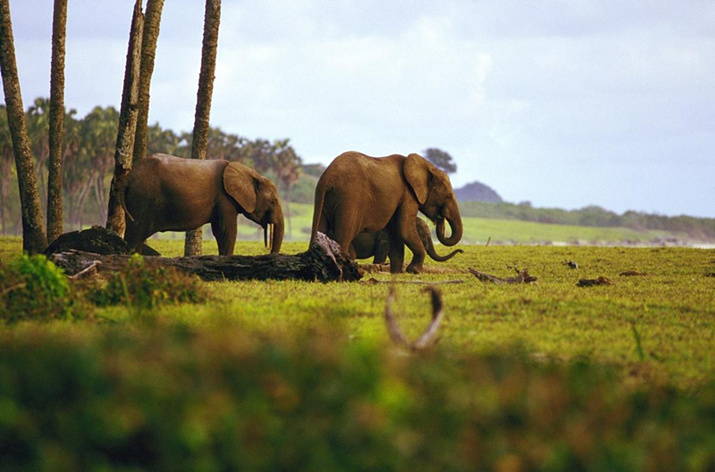|
||||||||||
| Home Nation World Business Opinion Lifestyle ChinAfrica Multimedia Columnists Documents Special Reports |
|
||||||||||
| Home Nation World Business Opinion Lifestyle ChinAfrica Multimedia Columnists Documents Special Reports |
| Africa |
| Hands off Wildlife |
| Chinese enterprises operating in Africa join hands to protect African wildlife |
| By Ge Lijun | VOL. 9 May 2017 ·2017-04-28 |

The population of elephants in Africa has suffered a drastic decline in recent years
The exquisite ivory artifacts in elegantly decorated shop windows are seductive to the eye, luring art and craft enthusiasts like bees to honey. The avid buyers who marvel at the milk-colored exotic statuettes, bracelets and necklaces from a faraway land have little idea of their origin. In their ignorance they are oblivious to the ugly truth of the slaughter, poaching and trafficking of the planet's endangered wildlife - all part of the process to bring these beautiful objects to market.
These are some of the issues raised by Protecting Our Home, a documentary film presented on March 21 during a conference held in Beijing on the challenges faced by Chinese companies in protecting African wildlife. The conference was jointly organized by Wildlife Conservation Society (WCS), China Wildlife Conservation Association and the consulting firm SynTao.
Filmed in Tanzania's Serengeti National Park with the aim of raising awareness of the devastating effects of wildlife poaching, the documentary had a significant impact at the time of its release in 2014, with a number of Chinese stars calling for a ban on the ivory trade in China. The documentary was made possible by the Travel Channel of Hainan Broadcasting Group, WCS, Tanzania National Park, and Poly International, a Chinese foreign trade and investment enterprise.
"For a long time now, Poly International has actively funded international organizations, government agencies and social organizations, among others, involved in wildlife protection. This year, we plan to conduct researches on elephant protection in Uganda," Ye Wenhua, International Program Director at Poly International, told the conference.
In addition to Poly International, an increasing number of Chinese companies active on the continent are now paying attention to wildlife protection. "In discovering the purchase of ivory, Chinese enterprises have to play their part," said Ye.
Targeted measures
China National Petroleum Corp. (CNPC), a large petroleum and natural gas company, provided a best-practice example of harmonious coexistence between development and fauna during the construction of their pipeline in Kenya's Lake Nakuru National Park in 2010-11. Workers were first given training on wildlife, covering different aspects such as how to act appropriately in a wild environment.
Knowing the animals and their habits is also a way of protecting the workers. Specific guidelines were drafted in this regard. For example, as CNPC's red workwear could potentially disrupt animals, the company opted instead for a less garish uniform. On the construction site, workers were also equipped with fire extinguishers, enabling them to react quickly in case of fire.
In addition, simple and effective operating procedures were adopted and implemented. For example, workers had to reduce the noise of their machinery by slowing down their operation so as not to affect the wildlife; meanwhile, they had to make sure to leave no rubbish behind once their work was done.
"In recent years, we have started to implement similar measures in other African countries, and even in Latin American countries and China, to protect the animals and the environment," said Shi Jing, researcher at the CNPC Research Institute of Economics and Technology.
More stakeholders
The Chinese Government is also stepping in to play its part. The Endangered Species Import and Export Management Office (ESIEMO), a government body under China's State Forestry Administration, cooperates with Chinese companies and travel agencies to provide training to company employees and tourists to Africa on laws and regulations concerning wildlife protection in African countries, particularly with regard to smuggling, with the help of Chinese embassies in Africa and local organizations in Kenya, Ethiopia, South Africa and Mozambique.
"In 2017, we will cooperate with WCS to send four groups of experts to eight African countries to train the workers of companies on more specific aspects, for example on the habits of certain animals," said Meng Xianlin, Executive Deputy Director General of ESIEMO.
WCS - a U.S.-based NGO - has been working to protect African wildlife since the 1950s. Over the last few years, as a large number of Chinese enterprises are increasingly making their mark in the remote regions of the African continent, cooperation between the two sides has been increasing, according to Kang Aili, WCS Asia Program Executive Director.
A multi-year survey on the factors that discourage ivory buyers made in China shows that criminal sanctions are at the top of the list. Other significant factors include the opposition to these sales by the Chinese Government and the disapproval of the companies themselves. "Companies therefore play a very important role in inciting the public and their employees to boycott illegal wildlife trade," said Li Lishu, Executive Manager of WCS Chinese Trade Program, at the conference.
"We need more investment and more funds. Our country has not yet resolved the issues of poaching and smuggling. We want Chinese companies to help us solve these problems," said Henry Mayega, Deputy Head of Mission at the Ugandan Embassy in China, adding that governments, NGOs and businesses need to find a more effective mode of cooperation.
To better help Chinese companies operating overseas protect local wildlife, the consulting firm SynTao created a "risk map" for Chinese companies operating abroad, with risk indices including environmental vulnerability.
"The protection of biodiversity must be integrated into the culture of an enterprise, including the exploitation and use of renewable animal and plant resources," said Zhou Mi, researcher at the Chinese Academy of International Trade and Economic Cooperation under the Ministry of Commerce.
| About Us | Contact Us | Advertise with Us | Subscribe |
| Copyright Beijing Review All rights reserved 京ICP备08005356号-5 京公网安备110102005860号 |